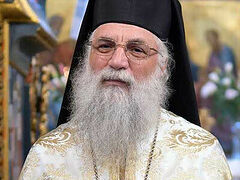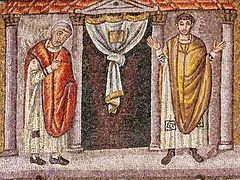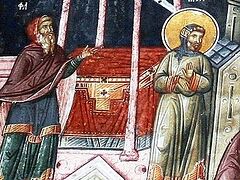 The disruptions of what we think of as normal life in our society in the last year should open our eyes to the reality of what it means to be human persons in the world as we know it. Despite the scientific and medical advances that we take for granted, a virus can still easily bring death, disease, and disruption in ways that no one can fully control. As usual, the crisis impacts the weakest members of society the most. Violence, hatred, and tribalism fueled by inflamed passions call into question the integrity of our nation’s form of government and political culture. A blast of extraordinarily cold weather reminds us how vulnerable we are before the elements and how dependent we are upon systems that provide energy, clean water, and food.
The disruptions of what we think of as normal life in our society in the last year should open our eyes to the reality of what it means to be human persons in the world as we know it. Despite the scientific and medical advances that we take for granted, a virus can still easily bring death, disease, and disruption in ways that no one can fully control. As usual, the crisis impacts the weakest members of society the most. Violence, hatred, and tribalism fueled by inflamed passions call into question the integrity of our nation’s form of government and political culture. A blast of extraordinarily cold weather reminds us how vulnerable we are before the elements and how dependent we are upon systems that provide energy, clean water, and food.
Despite all the conveniences and services that we assume today, such disruptions remind us that we share the common lot of our ancestors and of all peoples around the world. Regardless of what any generation, nation, or culture achieves, everyone remains subject to death and to all the corruptions of life in a world that remains “subjected to futility” and “groans and labors with birth pangs” for its redemption. (Rom. 8:20-22) Though physical health and social peace provide signs of God’s gracious purposes for us, they are not our salvation and fall short of manifesting the blessedness of the Kingdom. Like every generation, our only true hope is in the resurrection of our Lord, God, and Savior Jesus Christ, Who has conquered death through His Cross and empty tomb. He has made even the worst sufferings and injustices points of entrance into heavenly glory. His eternal reign stands in judgment of even the best arrangements and conditions of life in the world as we know it.
As we begin today the Lenten Triodion, the three-week period of preparation for Great Lent, we have the opportunity to use the recent disruptions in our lives to help us see the truth about our souls. Instead of placing our hope in any of the false gods commonly worshiped in our culture, we must remember the truth articulated by Solzhenitsyn: “The line dividing good and evil cuts through the heart of every human being.” Nothing about our life in the contemporary world excuses us from facing that abiding spiritual reality. As those who bear the image and likeness of God, we have two options. We may become more like our Lord in holiness as we ascetically turn away from addiction to self-centered desire and embrace His gracious divine energies for our salvation. Or we may remain enslaved to our passions as we diminish ourselves as distinctive persons and mar the beauty of our souls. That is a path that leads only to delusion and despair. It is, however, a tempting path because like our first parents we place satisfying our appetites before obedience to God. Those distorted desires are not only for food, but for satisfying ourselves in ways, whatever they may be, that can never heal our souls.
On this Sunday of the Pharisee and the Publican, the Church warns us against corrupting even the most central practices of our faith, the most basic disciplines that we should all embrace with special intensity during the coming weeks. The Pharisee was a respected scholar and teacher of the Old Testament law. He went to the Temple to pray, fasted regularly, and gave tithes from his earnings. He kept the outward forms of obedience to God, but the passion of pride had taken root in his soul in ways that destroyed the integrity of his practices. When the Pharisee prayed, he did not truly open his heart to God, but merely assured himself of how much better he was than other people. He surely felt very religious as he praised himself for being superior to “extortionists, unjust, adulterers, or even like this tax collector.” He used prayer to remind himself of how good he was because he fasted and tithed. He did not encounter God in his prayers, but merely spoke to himself about how great he was.
In sharp contrast, “the tax collector, standing far off, would not even lift up his eyes to heaven, but beat his breast, saying, ‘God, be merciful to me a sinner!’” As a Jew who collected taxes for the Roman army of occupation from his own people, he was a traitor. People like him collected more than what was required and lived off the difference. This man was a corrupt public official, essentially a thief. He had no good deeds or acts of piety to his credit. He did, however, have the humility to accept the truth about himself. He made no excuses and judged no one else. Instead, he opened his heart to God such that he knew from the depths of his soul that he was a sinner whose only hope was in the mercy of the Lord. That is why he “went down to his house justified rather than the other; for everyone who exalts himself will be humbled, but he who humbles himself will be exalted.”
“The line between good and evil cuts through the heart of every human being.” The key difference between the Pharisee and the Publican rooted in their hearts and was not simply a matter of their outward behavior or how they appeared to others. Even the despised traitor and thief remained in the image of God and was able to embrace divine mercy when he humbly confessed the truth about his personal brokenness. The Pharisee also bore God’s image, but was so blinded by his slavery to the primordial sin of pride that his spiritual practices lacked integrity and did his soul more harm than good.
Instead of allowing the problems of our time to distract us from having a holy Lent, we must use them as reminders that Christ’s Kingdom is not of this world. If we somehow distort our faith into a pursuit of good versus evil according to any worldly standard, we will end up like the Pharisee, praying in vain to ourselves as we invent excuses to condemn others. But if we use our current challenges as reminders of our need for a Lord Who conquers even death itself, then we will grow in the humility of the tax collector who realized that he had nothing to hope for other than the mercy of God.
As we prepare for the intensified prayer, fasting, and almsgiving of Lent, we must resist the temptation to think that anything we do will earn us a place among the good and above the evil. Thinking that way will make it impossible for us to gain any spiritual benefit during Lent, for our Lord died and rose up for the salvation of people whose slavery to sin and death was so profound that no amount of pious activity could ever set them free. Instead, we must use our Lenten disciplines to grow in the humility shown by the tax collector, who was aware only of his sinfulness and need for mercy. If we approach Lent with integrity, we will have many opportunities to do so. When we pray, our minds will likely wander. When we fast, we will probably become obsessed with food and often irritable. When we give, we typically learn how much we trust in our own possessions and comfort.
We must pray, fast, and practice generosity this Lent in order to open our darkened hearts to the brilliant light of Christ so that we will be able to see the truth about where we stand before Him. If we do so, we will not pat ourselves on the back and condemn others as did the Pharisee. No, we will recognize that the mercy of the Lord is the only hope for people who are so weak before their passions. Then by the time we celebrate Pascha, we will have a new awareness of the unfathomable love of the Savior Who died and rose up in order to set us sinners free. Let us use the coming season of Lent to become as humble as the tax collector as we follow our Lord to His Cross and empty tomb.



